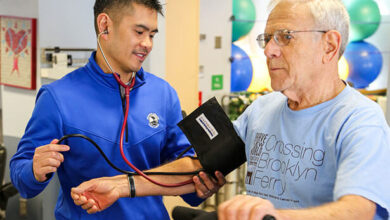Breaking Free: Navigating The Landscape Of Alcohol Recovery

The journey to overcome alcohol addiction is a profound and transformative experience that requires determination, support, and the right resources. Alcohol treatment programs serve as guiding lights on this path to recovery, offering individuals struggling with addiction the tools and strategies they need to reclaim their lives. In this comprehensive exploration, we delve into the essential components of alcohol treatment, shedding light on the diverse options available for those seeking a new beginning.
Understanding The Grip Of Alcohol Addiction
Alcohol addiction, scientifically known as alcohol use disorder (AUD), is a chronic condition marked by an inability to manage alcohol consumption, despite the detrimental consequences it wreaks on various aspects of life. AUD often manifests through cravings, tolerance, withdrawal symptoms, and an increasing preoccupation with alcohol. This multifaceted disorder affects individuals physically, mentally, and emotionally, highlighting the necessity of targeted interventions for a successful recovery.
The Imperative Of Professional Intervention
Recognizing the need for assistance is the foundational step toward lasting recovery. Seeking professional help is pivotal for individuals determined to break free from the clutches of addiction. Alcohol treatment programs offer tailored solutions that address the intricate layers of addiction, providing a comprehensive framework for healing and growth.
Embarking On Detoxification
In the first step of alcohol treatment, detoxing, the body is cleaned of alcohol safely while withdrawal symptoms are managed. This critical phase is best conducted under medical supervision to ensure safety, as withdrawal symptoms can vary in intensity. Medical experts can administer appropriate medications to alleviate discomfort and minimize potential health risks.
Inpatient Programs: Embracing Holistic Healing
For individuals grappling with severe AUD or those who need intensive care, inpatient treatment programs offer a comprehensive approach. Inpatient programs create a sheltered environment where individuals can focus solely on their recovery. These programs typically integrate medical detoxification, therapy sessions, counseling, and support groups. By minimizing exposure to triggers and stressors, inpatient treatment enhances the likelihood of achieving a successful, lasting recovery.
Outpatient Alternatives: Flexibility And Continued Progress
Outpatient alcohol treatment programs cater to those with milder forms of AUD or those transitioning from inpatient care. These programs provide the flexibility to receive treatment while maintaining daily routines. Depending on the individual’s needs, outpatient programs offer varying levels of intensity, from regular therapy sessions to more extensive programs involving group therapy, individual counseling, and educational workshops. This option ensures ongoing access to professional support and a structured recovery plan.
Therapeutic Approaches: Nurturing Emotional Well-Being
Central to alcohol treatment programs are therapeutic interventions that address the emotional and psychological facets of addiction. These strategies equip individuals with coping mechanisms, empowering them to manage triggers and cravings effectively. Notable therapeutic modalities include:
Cognitive Behavioral Therapy (CBT): CBT aids in recognizing and altering negative thought patterns and behaviors associated with alcohol use. It teaches practical skills to manage stress, cravings, and triggers, promoting healthier decision-making.
Motivational Interviewing (MI): MI fosters internal motivation for change by engaging individuals in collaborative conversations. Through empathy and understanding, therapists help individuals explore their feelings toward alcohol use, paving the way for meaningful transformation.
Group Therapy: Group therapy fosters a supportive environment where individuals can share experiences, challenges, and triumphs with peers on the journey to recovery. This communal approach combats feelings of isolation and strengthens the sense of belonging.
Family Therapy: Family therapy takes into account that alcoholism affects not only the person but also their family and friends. It works on relationship patterns and communication problems. This intervention empowers families to provide constructive support during the recovery journey.
Holistic Therapies: Complementary approaches like art therapy, yoga, mindfulness, and meditation contribute to overall well-being, alleviating stress, and fostering a balanced recovery.
Addressing Dual Diagnoses
Many individuals struggling with alcohol addiction also battle co-occurring mental health disorders. Effective alcohol treatment programs adopt a holistic approach, addressing both addiction and underlying mental health issues concurrently. This integrated care maximizes the potential for sustained recovery by acknowledging the interconnected nature of these challenges.
Safeguarding Progress: Aftercare And Relapse Prevention
Graduating from a formal alcohol treatment program marks the beginning of a lifelong commitment to recovery. Aftercare planning is vital, ensuring individuals have the necessary support systems to prevent relapse. Aftercare strategies encompass ongoing therapy, participation in support groups like Alcoholics Anonymous (AA), and regular medical follow-ups. By nurturing connections within the recovery community and applying coping skills acquired during treatment, individuals can navigate obstacles and maintain their progress.
Conclusion
Alcohol treatment programs stand as beacons of hope for individuals determined to triumph over alcohol addiction. These programs offer structured avenues for recovery, accommodating diverse needs through inpatient and outpatient options. With therapeutic interventions at their core, these programs address addiction’s physical and emotional dimensions, guiding individuals toward healing and transformation. The decision to seek help is a courageous step towards a brighter future, and with the support of professionals, therapists, and a compassionate community, individuals can embark on a journey of renewal, rediscovery, and lasting sobriety.




